On this day last year, the military certified the repeal of the discriminatory Don’t Ask Don’t Tell policy after Congress overturned the policy. Religious Right activists warned that the military will suffer as a result, however, their ominous predictions failed to materialize as studies show that the new policy is working and benefiting the military.
Consequently, it wasn’t a surprise that anti-gay groups were largely quiet today on the anniversary as their warnings about an exodus of soldiers, a drop in enlistments and a return of the draft were clearly wrong.
Ron Crews of the Chaplains Alliance for Religious Liberty released a statement that the “radical sexual agenda in our military” is leading to significant “negative consequences,” citing one example of possible sexual harassment, same-sex ceremonies on bases and the supposed “silencing” of chaplains and DADT supporters:
No Cause for Celebration: DADT Repeal Immediately Creates Major Problems for Service Members
Approaching the first anniversary of the repeal of the so-called DADT policy, mounting evidence demonstrates the negative consequences of implementing a radical sexual agenda in our military.
“The American armed forces exist to defend our nation, not as social experiment lab in which our troops serve as human subjects,” said Chaplain (Colonel Retired) Ron Crews, ED of CALL. ”While many will ignore the negative impacts, or pretend that they don’t exist, threats to our troops’ freedom are mounting.”
…
“This list of problems and incidents that have arisen mere months after this administration imposed its will on the armed forces is disturbing to say the least, and we know it is only the beginning,” said Crews. “Compounding the outrage, service members are not free to speak out about these matters. This ensures that distrust in the ranks will increase and morale will decrease as the number of silenced victims grows.”
Focus on the Family’s political arm CitizenLink also said in a post quoting Crews and calling for Congress to pass a GOP-backed bill banning same-sex ceremonies on military property, which they said would preserve religious freedom by barring all chaplains from performing such ceremonies:
Crew said that a military religious freedom act introduced in January, House Resolution 3828, would help military personnel greatly.
“It’s a right-of-conscience clause that would provide protection to military personnel, so they would not be affected by their opposition to the repeal,” he explained.
If passed, H.R. 3828 would protect members of the Armed Forces who hold religious or moral convictions concerning “the appropriate and inappropriate expression of human sexuality” from discrimination or punishment for their beliefs.
The bill seeks to protect chaplains from being ordered to perform any services or ceremonies contrary to their faith, while preventing any same-sex marriage ceremonies from being performed on military posts, in accordance with the federal Defense of Marriage Act.
Peter Sprigg of the Family Research Council, who predicted an increase in rape if the policy was repealed, pivoted away from his group’s hysterical claims to instead focus on possible same-sex marriages in the military, a result of the “radical sexual and social agenda” pushed by “homosexual activists.” Sprigg also cited a survey from the Military Times, but didn’t mention that the same poll found negative views of the repeal among service members are declining.
He also dismissed claims that the military would have “completely collapsed in the first year after repeal” since “our service members are too professional to allow that to happen,” but FRC president Tony Perkins did in fact predict the reinstitution of the draft and that congressmen who voted for the repeal will have “blood on their hands.”
Since eight servicemembers reported harm from both circumstances (a homosexual “coming out” and one joining their unit), a total of 36 separate individuals reported such harm. The Palm Center chose to emphasize that this was only 4.5% of all those surveyed—failing to mention that it represents twenty percent of those who had a homosexual “come out” or join their unit. Twenty percent represents a significant risk of harm for the units involved—merely to advance the goals of the sexual revolution. Damage to good order, discipline, morale, and unit cohesion need not be universal to be unacceptable.
In the same Military Times survey, 8.4% of respondents said that repeal made them less likely to remain in the military, while only 3.3% said it would make them more likely to remain.
The Palm Center report almost completely ignores the most significant harms that have become immediately apparent in the first year since repeal. Predictions that the use of the military to advance a radical social/sexual agenda would place us on a “slippery slope” have clearly come true. Furthermore, assurances given in the November 2010 report of the Pentagon’s Comprehensive Review Working Group (CRWG) regarding the limited impact of repeal have not been fulfilled. Since the CRWG report was to a large extent the basis for the Congressional vote for repeal in December of 2010, it can even be argued that repeal was adopted under false pretenses.
…
Has America’s military completely collapsed in the first year after repeal? Of course not—our servicemembers are too professional to allow that to happen. The military is clearly being used, however, to advance a radical sexual and social agenda. The Palm Center cited one individual who stated that repeal “will help facilitate the slow cultural change towards greater acceptance” of homosexuality.
The purpose of our armed forces, however, is not to “facilitate cultural change.” It is to fight and win wars. By demanding that it do more than that, homosexual activists have undermined the single-minded focus that is necessary for military effectiveness.








